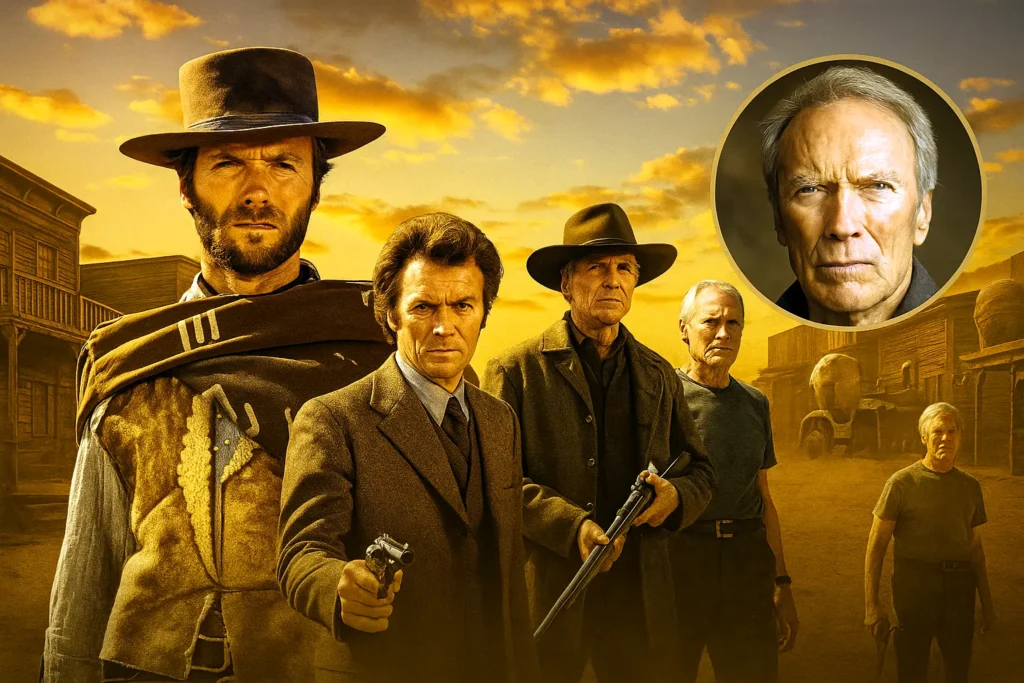Clint Eastwood’s Most Unforgettable Roles

When Clint Eastwood first appeared on screen in the 1950s, few could have predicted the cinematic force he would become. Over the decades, he’s reimagined the American hero, challenged genre norms, and earned respect not just as an actor, but as a director and storyteller. His filmography spans cowboys, cops, drifters, soldiers—and each role carries a kind of quiet weight that has become uniquely Eastwood.
His influence goes beyond grit and coolness. What sets Eastwood apart is his ability to give even the toughest characters an inner life. Whether he's squinting into a dusty horizon or confronting the ghosts of his past, there’s always something deeper brewing behind those narrowed eyes.
Here are five standout roles that helped define Clint Eastwood’s place in movie history.
1. The Man with No Name
“A Fistful of Dollars” (1964) to “The Good, the Bad and the Ugly” (1966)
Eastwood’s mysterious gunslinger in Sergio Leone’s Dollars Trilogy changed the Western forever. With a poncho, cigar, and a stare that said more than words ever could, he turned silence into suspense. These weren't traditional good guys—this was the beginning of the antihero era. The character barely spoke, yet he commanded the screen, and Eastwood’s restraint gave him a kind of mythic power.
Today, that squint-and-shoot energy is still echoed in action heroes around the world. But none ever quite matched the original.
2. Harry Callahan
“Dirty Harry” (1971)
"Do you feel lucky, punk?" The line alone is legendary, but what made Harry Callahan iconic was Eastwood’s ability to walk a moral tightrope. As a San Francisco detective who didn’t play by the rules, he became the face of justice at a time when audiences were grappling with authority and violence.
Eastwood played him with conviction—but never let him become cartoonish. Harry was scary, sure. But he was also tired. Worn down. Maybe even lost. That’s what made him unforgettable.
3. Josey Wales
“The Outlaw Josey Wales” (1976)
This one hits differently. Josey Wales isn’t just another tough guy—he’s a broken man. After losing his family during the Civil War, Wales turns outlaw, but the film is less about revenge than survival. Eastwood directs and stars, letting the story unfold with patience and empathy.
The character doesn’t chase glory; he stumbles toward healing. It’s one of Eastwood’s most understated performances—and one of his richest.
4. William Munny
“Unforgiven” (1992)
In “Unforgiven,” Eastwood returned to the Western—but not the way we remembered it. William Munny is a former killer, now a widowed pig farmer, drawn back into violence he tried to leave behind. The film strips away the romanticism of the Wild West and asks: what does violence really cost?
Eastwood won Oscars for directing and producing, but his acting is what holds the film together. Quiet. Haunted. Reluctantly brutal. This wasn’t the cowboy of the past. It was something heavier.
5. Walt Kowalski
“Gran Torino” (2008)
Walt Kowalski is a gruff, lonely veteran trying to keep the world out—until a teenage neighbor forces him to change. The role could’ve fallen into stereotype, but Eastwood plays it with surprising tenderness. His grumbles hide guilt. His anger masks sorrow.
The film became a late-career highlight, not because it was flashy, but because it felt so real. And in that final scene—no spoilers—it’s clear Eastwood still knew how to hit a nerve.
These characters aren’t just roles—they’re milestones in American film. Each one shows a different side of Clint Eastwood: the loner, the enforcer, the haunted man, the reluctant mentor. He never chased awards or flashy roles. He just kept telling stories that mattered to him—and in doing so, left behind some of the most memorable moments in cinema.
Whether directing from the shadows or standing alone in a dusty street, Eastwood remains one of film’s quietest powerhouses. And he’s not done yet.

Leave a Reply